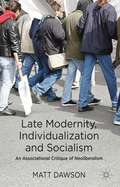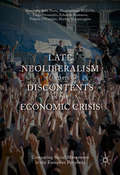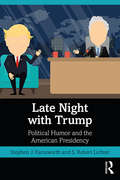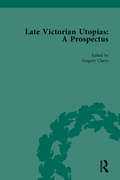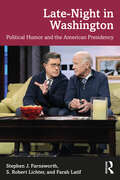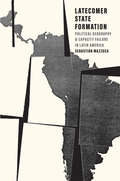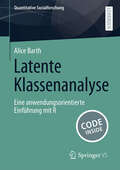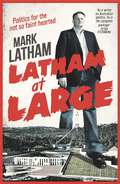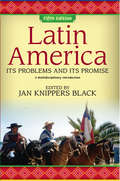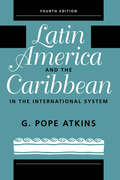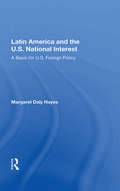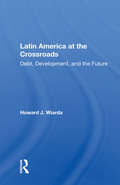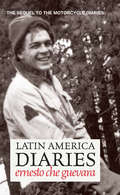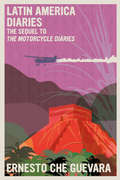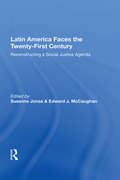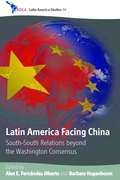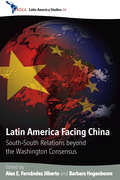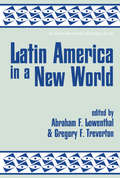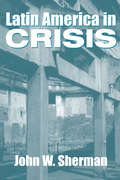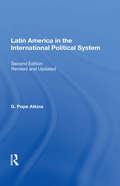- Table View
- List View
Late Modernity, Individualization and Socialism
by Matt DawsonInfluenced most notably by #65533;mile Durkheim and Zygmunt Bauman, Dawson outlines how this long neglected stream of socialist theory can help us more fully understand, and possibly move beyond, the problems of neoliberalism and our conceptions of political individualism.
Late Neoliberalism and its Discontents in the Economic Crisis
by Eduardo Romanos Massimiliano Andretta Donatella Porta Francis O’connor Tiago Fernandes Markos VogiatzoglouThis book analyses protests against the Great Recession in the European periphery. While social movements have long been considered as children of affluent times - or at least of times of opening opportunities - these protests defy such expectations, developing instead in moments of diminishing opportunities in both the economic and the political realms. Can social movement studies still be useful to understanding these movements of troubled times? The authors offer a positive answer to this question, although specify the need to bridge contentious politics with other fields, including political economy. They highlight differences in the social movements' strength and breadth and attempt to understand them in terms of three sets of dimensions: a) the specific characteristics of the socio-economic crisis and its consequences in terms of mobilization potential; b) the political reactions to it, in what we can define as political opportunities and threats; and c) the social movement cultures and structures that characterize each country. The book discusses these topics through a contextualized analysis of anti-austerity protest in the European periphery.
Late Night with Trump: Political Humor and the American Presidency
by S. Robert Lichter Stephen J. FarnsworthPolitical humor has been a staple of late-night television for decades. The Trump White House, however, has received significantly greater attention than that of past presidents, such as Barack Obama, George W. Bush, and even Bill Clinton. In response to Trump’s strident politics, late-night comics, including Stephen Colbert, Jimmy Kimmel, Trevor Noah and Jimmy Fallon, have sounded key policy notes, further blurring the boundary between news and satire. Weekly humorists, including John Oliver and Samantha Bee, extend the critique with in-depth probing of key issues, while Saturday Night Live continues to tap the progression from outrage to outrageousness. Using unique content analysis techniques and qualitative discussions of political humor, Farnsworth and Lichter show how late-night political humor, and these seven programs in particular, have responded to the Trump presidency. Employing a dataset of more than 100,000 late night jokes going back decades, these noted media scholars discuss how the treatment of Trump differs from previous presidents, and how the Trump era is likely to shape the future of political humor. The authors also employ public opinion survey data to consider the growing role these late-night programs play in framing public opinion and priorities. This book will interest scholars, the curious public, and students of politics, communications and the media, and contemporary American culture.
Late Victorian Utopias: A Prospectus, Volume 3
by Gregory ClaeysThis collection of literary utopias calls for a complete overhaul of existing assumptions about utopian writing in this period. The representation of utopian texts in these volumes shows that William Morris is far from "representative" of basic trends in the genre in this era. This is Volume 3 of 6 and looks at selected works from 1886 to 1892.
Late-Night in Washington: Political Humor and the American Presidency
by S. Robert Lichter Stephen J. Farnsworth Farah LatifThis book traces the trajectory of late-night political humor, which has long been a staple of entertainment television and is now a prominent part of social media political discourse, especially when it comes to the presidency. From Richard Nixon on Laugh-In to Donald Trump’s avatar on Saturday Night Live, this book takes the next step and considers how late-night comedy treats Joe Biden, the new American president who strives to restore a civil public tone but offers far less comedy fodder than his predecessor. Employing content analysis, public opinion surveys, and a variety of other quantitative and qualitative research, the authors look beyond the day-to-day memes and mimes of late-night comics and show how political humor may evolve. For students and scholars of politics and the media, this book will appeal to the general public and political pundits as well.
Late-Night in Washington: Political Humor and the American Presidency
by S. Robert Lichter Stephen J. Farnsworth Farah LatifThis book traces the trajectory of late-night political humor, which has long been a staple of entertainment television and is now a prominent part of social media political discourse, especially when it comes to the presidency. From Richard Nixon on Laugh-In to Donald Trump’s avatar on Saturday Night Live, this book takes the next step and considers how late-night comedy treats Joe Biden, the new American president who strives to restore a civil public tone but offers far less comedy fodder than his predecessor. Employing content analysis, public opinion surveys, and a variety of other quantitative and qualitative research, the authors look beyond the day-to-day memes and mimes of late-night comics and show how political humor may evolve. For students and scholars of politics and the media, this book will appeal to the general public and political pundits as well.
Latecomer State Formation: Political Geography and Capacity Failure in Latin America
by Sebastian MazzucaA major contribution to the field of comparative state formation and the scholarship on long-term political development of Latin America Latin American governments systematically fail to provide the key public goods for their societies to prosper. Sebastián Mazzuca argues this is because nineteenth-century Latin American state formation occurred in a period when commerce, rather than war, was the key driver forging countries. Latin American leaders pursued the benefits of international trade at the cost of long-term liabilities built into the countries they forged, notably patrimonial administrations and dysfunctional regional combinations.
Latente Klassenanalyse: Eine anwendungsorientierte Einführung mit R (Quantitative Sozialforschung)
by Alice BarthDas Buch bietet eine kompakte, anwendungsorientierte Einführung in die Technik der latenten Klassenanalyse. Grundlagen des Verfahrens sowie Voraussetzungen, praktische Anwendung und Ergebnisinterpretation werden verständlich erläutert. Die Analyse latenter Klassen ist ein statistisches Klassifikationsverfahren, bei dem mehrere kategoriale, manifeste Variablen zu vorher unbeobachteten Gruppen zugeordnet werden. So können z.B. aus einer Vielzahl von Variablen Typologien entwickelt werden. Für die Durchführung der Analysen wird die Open Source-Statistikumgebung R genutzt. Die verwendeten Syntaxbefehle sowie die Ausgabe der Ergebnisse werden erläutert, zusätzlich sind die kommentierte R-Syntax sowie Beispieldaten als elektronisches Zusatzmaterial im GitHub-Repositorium des Buches auf SpringerLink verfügbar. Die in den Beispielen verwendeten Daten haben keine Zugangsbeschränkung und können kostenfrei heruntergeladen werden, um die Analysen selbst nachzuvollziehen.
Latham at Large
by Mark LathamMark Latham is, by his own admission, the most outspoken, rebellious, thoroughly uncontrollable former leader in Labor Party history.In these brilliantly written opinion pieces Latham pulls no punches as he scrutinises the Australian political landscape, looking at everything from climate change to Clive Palmer, to what went wrong with Rudd-Gillard and what's now wrong with Abbott. Beyond politics, Latham dabbles in his other great interests, such as critiquing the modern media and explaining his fascination with horse racing. His hilarious 'Henderson Watch' columns and other satirical writing also feature in Latham at Large.Mark Latham has a formidable intellect and a forensic ability to get to the bottom of things. This is an entertaining, thought-provoking, sometimes scathing, often humorous collection from a man who is not afraid to speak his mind. There is no one else like him in Australian public life.
Latin America
by Jan Knippers BlackGives undergraduate students a broad understanding of the evolution of issues and theoretical frameworks in Latin American studies. Examines developments of the 1990s such as economic growth, privatization, and ecological awareness, and gives special attention to the expanding influence of Latin American intellectual, literary, and artistic contributions. Highlights of this third edition include discussions of the resolution of conflict in Central America, the trend toward redemocratization in South America, and the impact of drugs and debt throughout the region. Annotation c. by Book News, Inc. , Portland, Or.
Latin America
by Jan Knippers BlackNow in a fifth edition, Latin America has been updated to reflect the region's growing optimism as economies stabilize, trade diversifies, and political systems become more participatory. This multidisciplinary survey of Latin American history, politics, and society features invited contributions from authorities in a variety of fields. New sections address current events including deforestation in Costa Rica and Brazil, emerging social movements, Ecuador's new constitution, and Obama's stated objectives to repair U.S. relations with the region. In addition, key topics--such as women and Latin American politics, socialist governments and anti-American sentiment, Argentina's deteriorating economy, and Colombia's struggle with military and narcotics issues--receive expanded and revitalized treatment. Other updated material covers outcomes of recent elections in Bolivia, Brazil, and Nicaragua, among others. Through a hybrid thematic and regional organization, this text provides an essential foundation for introductory courses on Latin America.
Latin America
by Jan Knippers BlackNow in a fifth edition, Latin America has been updated to reflect the region's growing optimism as economies stabilize, trade diversifies, and political systems become more participatory. This multidisciplinary survey of Latin American history, politics, and society features invited contributions from authorities in a variety of fields. New sections address current events including deforestation in Costa Rica and Brazil, emerging social movements, Ecuador's new constitution, and Obama's stated objectives to repair U.S. relations with the region. In addition, key topics--such as women and Latin American politics, socialist governments and anti-American sentiment, Argentina's deteriorating economy, and Colombia's struggle with military and narcotics issues--receive expanded and revitalized treatment. Other updated material covers outcomes of recent elections in Bolivia, Brazil, and Nicaragua, among others. Through a hybrid thematic and regional organization, this text provides an essential foundation for introductory courses on Latin America.
Latin America After Neoliberalism
by Christopher WyldeWylde analyzes Kirchnerismo in Argentina and the developmental regime approach in the political economy of development in Latin America. He shows the systematic way in which relationships between state-market, state-society, and national-international dichotomies can be characterised within a developmentalist paradigm.
Latin America And The Caribbean In The International System: Fourth Edition
by G. Pope AtkinsThe fourth edition of this widely praised text has been thoroughly revised to reflect the evolving characteristics of the current international system that have had a dramatic effect on every aspect of international relations of Latin America and the Caribbean. The original purpose of this book is unchanged: It continues to provide a topically current and analytically integrated survey of the region's role in the world. Still organized around the idea of Latin America and the Caribbean as a separate subsystem within the global international system, the discussion gives special emphasis to complex interstate and transnational structures and processes. Within this framework, Atkins analyzes the foreign policies of the Latin American states themselves and those of the United States and other countries toward Latin America and the Caribbean. He also looks closely at the nature and role of transnational actors in the region, such as the multinational corporations, the Holy See, Protestant Churches, transnational political parties, international labor, nongovernmental organizations, and others. He gives special attention to Latin American participation in international institutions at all levels.
Latin America And The U.s. National Interest: A Basis For U.s. Foreign Policy
by Margaret Daly HayesArguing for a new and sober look at the nature of U.S.-Latin American relations, Dr. Hayes addresses the question: Does the United States have compelling national interests in maintaining close relations with Latin American countries? Her conclusion is yes, but for reasons different from those offered in the traditional literature or espoused by many policy analysts. She maintains that U.S. interests in relations with Latin America are primarily political, secondarily economic--though economic ties are the basis of the relationship--and only marginally military. Proper emphasis on these long-term interests may be critical to U.S. national security in a global, as well as regional, context. Dr. Hayes points out that the Latin American countries--occupying a unique position among developing nations today because of their comparatively successful experiences in achieving economic growth and development--represent an increasingly important political influence in both the developed and developing worlds. Moreover, she argues, it is in the U.S. interest to give economic aid to the less-developed countries in the hemisphere, particularly in the Caribbean Basin: U.S. security is better preserved and enhanced by encouraging political and economic stability in the region than by promoting military alliances that Latin Americans may not really want. Supporting the need for a revised rationale for U.S.-Latin American relations, Dr. Hayes focuses in detail on the regions and nations of special interest to the United States today: the Caribbean Basin, Mexico (in a chapter by Professor Bruce M. Bagley), Brazil, and the Southern Cone.
Latin America At The Crossroads: Debt, Development, And The Future
by Howard J. WiardaA provocative and controversial look at Latin America as it stands at a crossroads, this book analyzes the complex economic and social roots of the debt crisis and evaluates the prospects for new development strategies for the 1990s. Dr. Wiarda begins by placing the regional economic crisis in the larger context of technological change, political upheaval, and the international economy. He then explores new choices and realities in inter-American relations and the role international lending agencies can take to assist Latin America in meeting the challenge of the next decade. The author suggests that "smokescreens and mirrors" have obscured the true nature of the crisis and, as a result, have skewed the policy debate.
Latin America Confronts the United States
by Tom LongLatin America Confronts the United States offers a new perspective on US-Latin America relations. Drawing on research in six countries, the book examines how Latin American leaders are able to overcome power asymmetries to influence US foreign policy. The book provides in-depth explorations of key moments in post-World War II inter-American relations - foreign economic policy before the Alliance for Progress, the negotiation of the Panama Canal Treaties, the expansion of trade through NAFTA, and the growth of counternarcotics in Plan Colombia. The new evidence challenges earlier, US-centric explanations of these momentous events. Though differences in power were fundamental to each of these cases, relative weakness did not prevent Latin American leaders from aggressively pursuing their interests vis-à-vis the United States. Drawing on studies of foreign policy and international relations, the book examines how Latin American leaders achieved this influence - and why they sometimes failed.
Latin America Diaries
by Ernesto Che Guevara"A wonderful glimpse into the maturing mind of a great man and a vital companion to the previous Che diaries."-Michael McCaughan, The Irish Times"Guevara . . . chronicles labor uprisings and resistance against the influences and interests of the US and its intelligence operations. Guevara's passions for history, archaeology, and science are also apparent in this absorbing glimpse of the development of a legendary revolutionary figure."-Vanessa Bush, Booklist"This second volume of travel diaries by revolutionary icon Guevara (after Motorcycle Diaries) shows the 25-year-old rebel wandering around South America in the latter half of 1953."-Publishers WeeklyThis sequel to The Motorcycle Diaries includes letters, poetry, and journalism that document Ernesto Che Guevara's second Latin American journey following his graduation from medical school. After traveling through Bolivia, Peru, Ecuador, and Central America, Ernesto witnesses the 1954 US-inspired coup in Guatemala. He flees to Mexico where he encounters Fidel Castro, marking the beginning of a political partnership that profoundly changes the world and Che himself.This new, expanded edition has been fully revised especially for Ocean Press by Che's widow Aleida March, meticulously correcting her own work of checking Che's handwriting. Includes thirty-two pages of unpublished photos, including photos taken by Che's son Ernesto as he retraces his father's footsteps. Features a prologue by Alberto Granado, Che's traveling companion in The Motorcycle Diaries.
Latin America Diaries: The Sequel to The Motorcycle Diaries (The Che Guevara Library)
by Ernesto Che GuevaraThe sequel to The Motorcycle Diaries, this book is Ernesto Che Guevera's journal documenting the young Argentine's second trip through Latin America, revealing the emergence of a committed revolutionary.These letters, poetry, and journalism document young Ernesto Guevara's second Latin American journey following his graduation from medical school in 1953. Together, these writings reveal how the young Argentine is transformed into a militant revolutionary.After traveling through Bolivia, Peru, Ecuador, and Central America, Ernesto witnesses the 1954 US-inspired coup in Guatemala, which has a profound effect on his political awareness. He flees to Mexico where he encounters Fidel Castro, marking the beginning of a political partnership that profoundly changes the world and Che himself. Includes a foreword by Alberto Granado, Che's companion on his first adventures in Latin America on a vintage Norton motorcycle, and features poems written by young Ernesto inspired by his experiences along with facsimiles of pages from his diary.
Latin America Faces The Twenty-first Century: Reconstructing A Social Justice Agenda
by Susanne Jonas Edward J. McCaughanWhat are Latin America’s prospects for the twenty-first century, in the face of rapidly changing international conditions and increasing internal social pressures? In this volume eminent Latin American scholars and activists explore their collective future. They analyze a wide range of issues, including economic alternatives to neoliberal policies,
Latin America Facing China
by Alex E. Fernandez JilbertoThe last quarter of the twentieth century was a period of economic crises, increasing indebtedness as well as financial instability for Latin America and most other developing countries; in contrast, China showed amazingly high growth rates during this time and has since become the third largest economy in the world. Based on several case studies, this volume assesses how China's rise - one of the most important recent changes in the global economy - is affecting Latin America's national politics, political economy and regional and international relations. Several Latin American countries benefit from China's economic growth, and China's new role in international politics has been helpful to many leftist governments' efforts in Latin America to end the Washington Consensus. The contributors to this thought provoking volume examine these and the other causes, effects and prospects of Latin America's experiences with China's global expansion from a South - South perspective.
Latin America Facing China
by Alex E. Fernandez Jilberto† Barbara HogenboomThe last quarter of the twentieth century was a period of economic crises, increasing indebtedness as well as financial instability for Latin America and most other developing countries; in contrast, China showed amazingly high growth rates during this time and has since become the third largest economy in the world. Based on several case studies, this volume assesses how China's rise - one of the most important recent changes in the global economy - is affecting Latin America's national politics, political economy and regional and international relations. Several Latin American countries benefit from China's economic growth, and China's new role in international politics has been helpful to many leftist governments' efforts in Latin America to end the Washington Consensus. The contributors to this thought provoking volume examine these and the other causes, effects and prospects of Latin America's experiences with China's global expansion from a South - South perspective.
Latin America In A New World
by Abraham F Lowenthal"This comprehensive overview, presenting the views of eminent scholars and practitioners, explores in useful detail the new Latin America's changing relationships with the United States, Europe, Japan, and other regions. It is excellent and most timely".--Enrique V. Iglesias, President, Inter-American Development Bank. Lightning Print On Demand Title
Latin America In Crisis
by John W. ShermanThis book examines the intellectual problem of Latin American poverty, and discusses some of the explanations scholars have traditionally used to account for it. It focuses on its political and military dimensions of revolution and counterrevolution in the postwar era.
Latin America In The International Political System: Second Edition, Fully Revised And Updated
by G. Pope AtkinsMore than a decade has passed since the publication of the first edition of Latin America in the International Political System. Since then, significant events have occurred in the region, and the nature of Latin America's international relations has changed considerably. Although the purpose of this text is unchanged-that of providing stude
